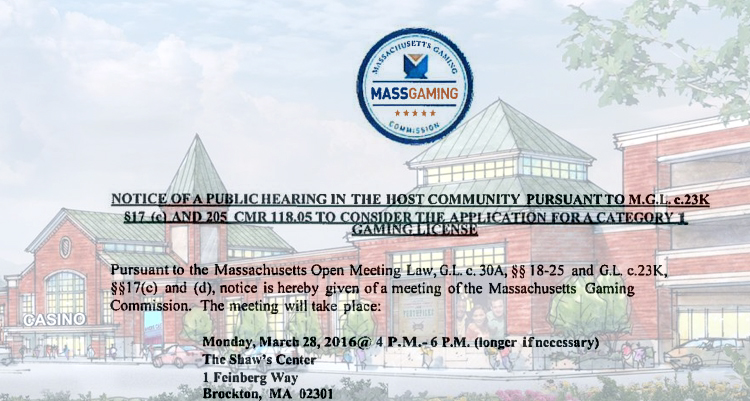The Massachusetts Gaming Commission’s public meeting on Monday afternoon was the last one scheduled before the commission is to render a tough decision on whether to grant a final commercial casino license in the Southeastern region of the state. The commission has already granted licenses to a slots parlor and two casinos but recent developments in a major tribal casino planned for the area, along with increasing competition for new casinos in other New England states will make the decision difficult. Commission Chair Stephen Crosby has already stated that although the body is authorized to issue a third full casino license, it’s under no legal obligation to do so. He reiterated that position yesterday.
The $675 million casino project, backed by Chicago developer Neil Bluhm of Rush Street Gaming, and proposed by it’s subsidiary Mass Gaming and Entertainment, is slated for the fairgrounds in Brockton. Among other actions and potential actions complicating matters for the commission is a lawsuit filed in response to the U.S. Department of the Interior’s decision last year to award and land into trust status giving the Mashpee Wampanoag Tribe a place to build their casino. The lawsuit is partially funded by Bluhm according to local reports.
The tribe has warned of legal action and stated that granting a license to the Brockton casino would violate the tribe’s 2013 gaming compact with the state.
Bluhm warned it would be ‘risky’ to not award the license saying the odds of the Mashpee’s Taunton casino proposal being stymied were, “not insignificant,” perhaps ironically due to his involvement in pending litigation against the tribe’s $500 million Project First Light, to be financed at least in part by a Genting Group subsidiary.
The commission said that if they ended up with no viable casino option they could simply redo the entire process.
Public deliberations without public testimony are scheduled to begin in the last week of April. By law the commission may not decide whether to issue a license for the Brockton proposal sooner than 30 days nor later than 90 days after yesterdays meeting.



